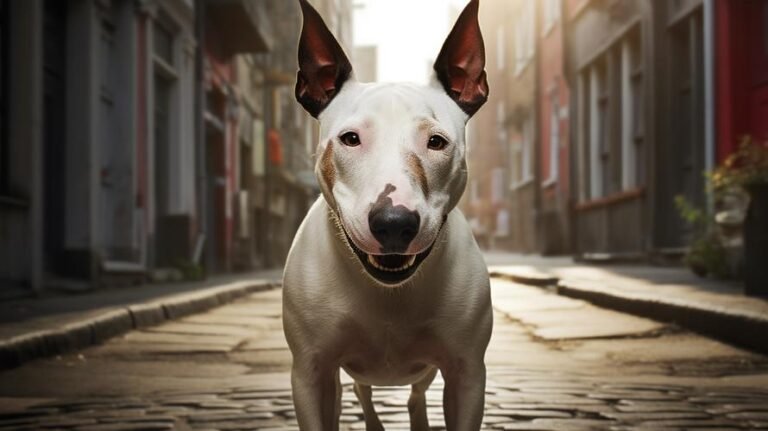Were you aware that Bull Terriers descended from an ancient breed of British dogs known as the “White English Terrier”? It’s true! These strong, energetic dogs have a heritage that dates back many centuries. Bull Terriers have a unique feature – the distinct curve of their nose. While they’re known for their strength and tenacity, they also have a soft side, making them wonderful family pets and protectors.
But as we celebrate their uniqueness, we must also consider something critical to their health – their diet. In particular, are Bull Terriers meant to eat grain-free food?
As a responsible, loving owner, it’s essential to understand your Bull Terrier’s dietary needs. But with the countless feeds and diets available in the market, finding the correct one is a bit of a labyrinth. However, do not fret; we’re here to give you all the information you need to decide if a grain-free diet is right for your Bull Terrier.
Firstly, what does grain-free mean? Grains are cereal crops like wheat, corn, barley, and rice which are commonly found in various commercially produced dog foods. A grain-free diet, therefore, eliminates these items. Instead, this diet is high in proteins and includes perfect alternatives like sweet potatoes, peas, and lentils.
The subject of whether Bull Terriers should eat grain-free can be a hot topic amongst pet owners. Well, that’s because the answer is not a simple ‘yes’ or ‘no.’ To hash it out, let’s dig in on the pros and cons of Bull Terriers eating grain-free.
On the positive side, many Bull Terrier owners advocate for grain-free diets because they’ve noticed improvements in their dog’s coat, skin, and general health. Some Bull Terriers have specific grain allergies or intolerances, making a grain-free diet more of a necessity than a choice. These dogs might experience symptoms such as skin rashes, gastrointestinal upset, or excessive gas after consuming grains. In such cases, a grain-free diet can be a game-changer.
Moreover, Bull Terriers have a unique metabolism and high protein requirements. A grain-free diet, being high in protein content, might therefore be beneficial in providing these robust, active dogs the energy they need.
However, it’s crucial to also consider the potential downsides. A study by the US Food and Drug Administration (FDA) pointed out a possible link between grain-free food and dilated cardiomyopathy (DCM), a type of heart disease, in dogs. However, the research is ongoing, and no definitive conclusions have been drawn.
Moreover, a grain-free diet might result in nutritional deficiencies over time. Grains provide essential nutrients such as fiber, protein, and several B Vitamins. Therefore, if grains are eliminated, these nutrients must be supplemented from other sources.
After reviewing both sides of the argument, a clear-cut answer still remains elusive. Thus, it’s important to understand that nutritional needs can vary greatly among individual dogs, despite the breed.
Instead of wholly relying on general advice or common beliefs, your dog’s overall well-being, health history, and age should take precedence. A consultation with a veterinarian or a dog nutritionist might be your best bet to discern if a grain-free diet is the way to go.
Remember, Bull Terriers are unique, not just by virtue of their historical heritage but also with respect to their dietary needs. Also, in case you decide to switch to a grain-free diet, always introduce the change gradually to allow your dog’s system to adapt.
In conclusion, the question of whether your Bull Terrier should eat grain-free is not black and white. While it may have some potential benefits, it’s essential to ensure that your Bull Terrier gets a balanced and nutritious diet, whether it includes grains or not. Real love for your pet means putting their nutritional needs first, and it’s safe to say, that’s a cause we all can agree on.



